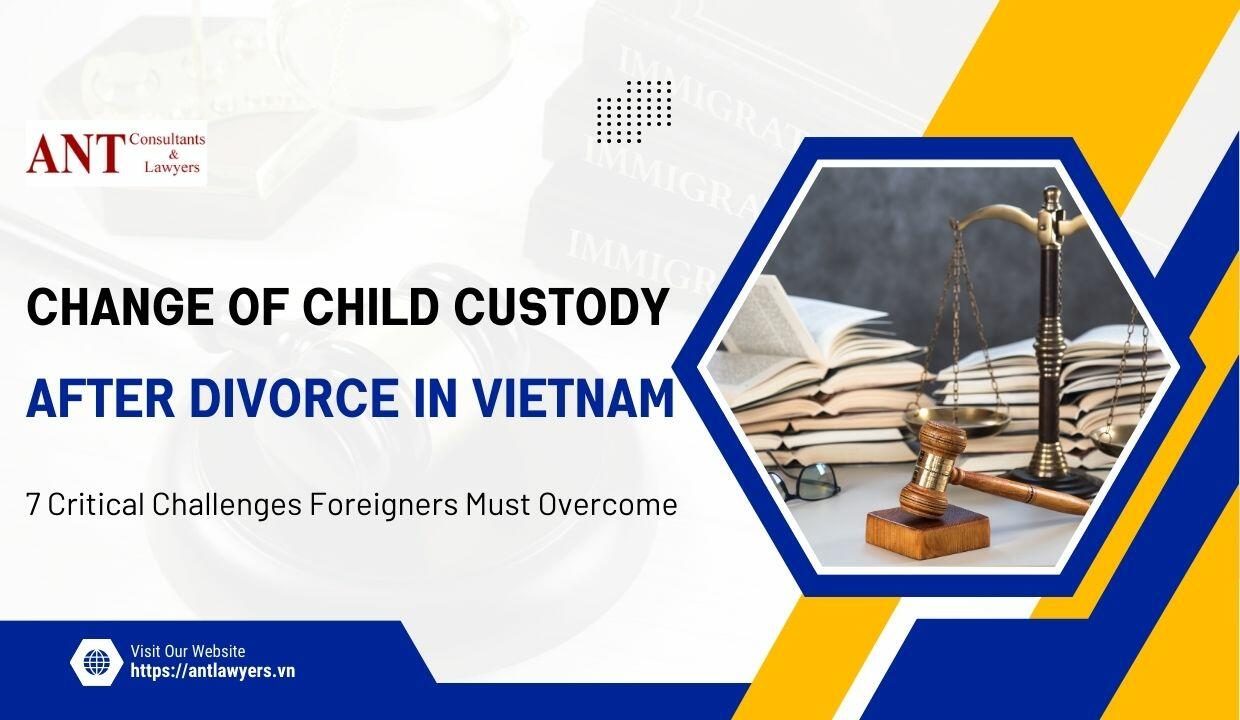Divorcing in a foreign country is already complex, but when children are involved, the situation becomes even more daunting. If you are a foreigner divorcing a Vietnamese spouse, navigating the change of child custody after divorce can be legally and emotionally challenging.
Custody battles often arise when one parent seeks to relocate, disputes parenting abilities, or argues that the child’s best interests are not being met under the current arrangement. For foreigners, legal barriers, cultural differences, and Vietnam’s family law framework add another layer of complexity to securing custody modifications.
In here, we will explore the legal process, the key factors courts consider, and the critical challenges you may face for change of child custody after divorce in Vietnam.

Understanding Child Custody Laws in Vietnam
Vietnam Law on Marriage and Family governs parental rights, child support, and custody matters.
The Practice of Child Custody in Vietnam
In child custody in Vietnam, the courts prioritize the child’s best interests, typically awarding custody of young children to the mother unless there are strong reasons to decide otherwise.
Legal Grounds for Change of Child Custody After Divorce
Changing custody is not automatic. The parent seeking modification must prove that a change of child custody after divorce is necessary due to significant life changes affecting the child’s well-being.
Vietnamese courts generally consider the following factors:
- A drastic change in one parent’s circumstances (e.g., financial instability, relocation, criminal record).
- Neglect, abuse, or inability to care for the child properly.
- The child’s preference (if they are mature enough to express their wishes).
- The custodial parent violating the original custody agreement (e.g., denying visitation rights).
If a foreign parent seeks to take custody, they must demonstrate that their custody would be more beneficial for the child’s overall development.
The Legal Process for Changing Child Custody After Divorce
Foreigners seeking a change of child custody after divorce must go through a legal process that includes:
Filing a Petition
The requesting parent must submit a petition to the Vietnamese court, outlining the reasons for the custody change. This petition must include supporting evidence such as financial records, medical reports, and testimonies from witnesses.
Mediation and Negotiation
Vietnamese law encourages mediation between parents before taking the case to trial. Mediation may help resolve custody disputes amicably, but if it fails, the case proceeds to court.
Court Hearing and Judgment
If mediation does not result in an agreement, a court hearing takes place. The judge evaluates evidence, hears both parents’ arguments, and may interview the child (depending on their age). The court then issues a decision based on the child’s best interests.
Challenges Foreigners Face in Changing Child Custody After Divorce
Legal and Language Barriers
Vietnamese family law is complex, and most legal proceedings are conducted in Vietnamese. Foreign parents may struggle to understand legal terminology, court procedures, and required documentation. Hiring a competent Vietnamese family lawyer is crucial to overcoming these challenges.
Cultural and Judicial Bias
Vietnamese courts often favor local parents, particularly mothers, in custody cases. Foreign fathers, in particular, may find it difficult to convince the court that they should be granted custody unless there is strong evidence of neglect or abuse by the Vietnamese parent.
Challenges in Proving Financial Stability
To secure a change of child custody after divorce, the foreign parent must prove they can provide a stable environment. However, if they are working overseas or frequently travel for business, courts may hesitate to grant custody, fearing instability in the child’s life.
Restrictions on Relocation with the Child
If a foreign parent plans to relocate the child abroad, Vietnamese courts may reject the request unless it is proven that moving serves the child’s best interests. The court will consider factors such as education opportunities, emotional support, and the child’s connection to Vietnam.
Difficulty in Enforcing Custody Agreements
Even if a foreign parent successfully obtains custody, enforcing the ruling can be difficult. If the Vietnamese parent refuses to comply, the foreign parent may need legal assistance to ensure enforcement through the court system.
Resistance from Extended Family
Vietnamese families often have a strong influence on child-rearing decisions. Even if a foreign parent wins custody, they may face opposition from the child’s extended Vietnamese family, who may attempt to block enforcement.
Costs and Length of the Legal Process
The legal process for a change of child custody after divorce can be lengthy and expensive. Court fees, legal representation, and document translation costs can add up, making it a financially draining battle.
Strategies to Strengthen Your Custody Case
If you are a foreign parent seeking a change of child custody after divorce, follow these strategies to improve your chances of success:
Build Strong Evidence
Gather documentation proving your ability to provide a stable, nurturing environment. Include:
- Financial records
- Testimonies from teachers, doctors, or family members
- Proof of stable living conditions
- Evidence of the custodial parent’s inability to care for the child (if applicable)
Propose a Fair Custody Arrangement
If seeking full custody is unlikely, consider negotiating for joint custody or expanded visitation rights. Courts may be more open to approving modifications that allow the child to maintain strong connections with both parents.
Show Cultural Understanding
Vietnamese courts may be more receptive to foreign parents who respect and support the child’s connection to Vietnamese culture, language, and traditions. Demonstrating this commitment can positively influence the court’s decision.
Alternative Dispute Resolution: Mediation in Custody Cases
Mediation is a preferred method of resolving custody disputes in Vietnam. Instead of engaging in a lengthy court battle, parents can negotiate an agreement with the help of a mediator. This approach is often less stressful and helps maintain a cooperative co-parenting relationship.
Conclusion
Navigating the change of child custody after divorce in Vietnam is complex, especially for foreign parents. Understanding the legal framework, anticipating challenges, and preparing a strong case are crucial for success.
If you are a foreigner seeking custody modifications, consult an experienced Vietnamese family lawyer to guide you through the process. With the right approach, you can protect your parental rights while ensuring the best possible outcome for your child.
About ANT Lawyers, a Law Firm in Vietnam
We help clients overcome cultural barriers and achieve their strategic and financial outcomes, while ensuring the best interest rate protection, risk mitigation and regulatory compliance. ANT lawyers has lawyers in Ho Chi Minh city, Hanoi, and Danang, and will help customers in doing business in Vietnam.
How ANT Lawyers Could Help Your Business?
Please click here to learn more about ANT Lawyers Civil Matters Practice or contact our lawyers in Vietnam for advice via email ant@antlawyers.vn or call our office at +84 28 730 86 529




